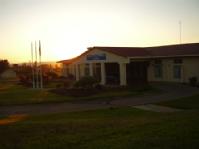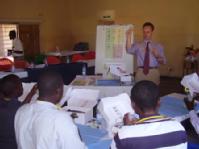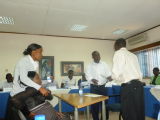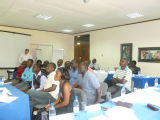Training in Malawi
Pilot course
 In May 2011, a team from Warwick University went to Malawi to deliver a pilot teaching course. The aim was to see how the new course content would work in practice, in particular the elements of leadership training, team working in scenarios of emergency situations and in the trainees' teaching of their peers. The team met up to plan the details of the week, and the course itself took place over four days with 8 NPCs from in and around Nkhotakota.
In May 2011, a team from Warwick University went to Malawi to deliver a pilot teaching course. The aim was to see how the new course content would work in practice, in particular the elements of leadership training, team working in scenarios of emergency situations and in the trainees' teaching of their peers. The team met up to plan the details of the week, and the course itself took place over four days with 8 NPCs from in and around Nkhotakota.
The programme was intensive, with considerable emphasis on decision-making in "real life" scenarios together with practice in teaching the new skills
There are further details about the programme of teaching and some photos of training sessions.
The teaching was delivered by:
- Dr Chisale Mhango, College of Medicine, Malawi
- Dr Francis Kamwendo, College of Medicine, Malawi
- Prof Siobhan Quenby, University of Warwick, UK
- Dr Doug Simkiss, University of Warwick, UK
- Dr Paul O'Hare, University of Warwick, UK
Module 1 "Emergency obstetrics and neonatal care in resource-limited setting"
 Following the success of the pilot course, the training was repeated in November - December 2011 in Lilongwe, with over 40 students attending.
Following the success of the pilot course, the training was repeated in November - December 2011 in Lilongwe, with over 40 students attending.
The teaching methods included role play and scenarios covering typical emergencies where the students were required to work as a team to manage the situation.
This method of learning was new to many of them and while they found the interactive style challenging, it was also considered by them to be more useful than the traditional lecture style. The role play helped to equip them in a practical way for the day-to-day events which they encounter.
Module 2 "Leadership and service improvement"
 This took place in May-June 2012 with a team of experts and leaders in the field of medical education.
This took place in May-June 2012 with a team of experts and leaders in the field of medical education.
The students participated in active learning sessions, with practical exercises and feedback central to the process. At the end of each block of training, prizes were given out to the best students. The prizes were high-quality surgical instruments, donated by an acquaintance of one of the ETATMBA tutors.
The module was led by Dr David Davies with input from Dr Alan Davies of GE Healthcare, as well as the invaluable assistance of:
- Prof Ed Peile (Warwick Medical School, Emeritus Professor, Medical Education)
- Mr Paul Long (NHS Leadership Framework Project NHS Institute for Innovation and Improvement and National Leadership Council London).
- Dr Vinod Patel (Warwick Medical School, Reader, Education and Development)
- Dr Garry Swann (Specialist in Clinical Systems Improvement)
- Dr Queen Dube (University of Malawi, paediatrician)
There are some photos of the students and training sessions.
Module 3 "Born too soon"
 This took place in November-December 2012 in Blantyre and focused on the use of ultrasound and the identification and management of preterm labour and delivery.
This took place in November-December 2012 in Blantyre and focused on the use of ultrasound and the identification and management of preterm labour and delivery.
GE Healthcare loaned portable V-Scanners for use in the training and the students found these invaluable in helping them to understand the fundamentals of obstetric scanning.
As with the other modules, formal assessment took place at the end of the training sessions in the form of OSCEs.
Module 4 "Professional project"
This was a substantial piece of work completed by the students as an assignment. It involved a literature review, audit and re-audit.
Module 5 "Understanding research evidence and critical appraisal"
This took place in May and June 2013 in Blantyre and focused on the importance of practicing evidence-based medicine and on assessing best practice.
Module 6 "Essentials of clinical training in obstetric and neonatal care in a low-resource setting"
This took place in May and June 2013 and focused on the practicalities of obstetric and neonatal care where resources are limited.
Module 7 "Science, skills and sepsis"
Module 7 took place in November 2013 in the College of Medicine in Blantyre and provided more detail on the scientific underpinning of obstetric and neonatal conditions as well as reviewing training and knowledge in the management of sepsis.
Module 8 "Second Professional Project"
Following on from Module 4 and the first professional project, this was another substantial piece of work focusing on clinical service improvement. Students were asked to identify an area of practice which could be improved, within their health care facility. They conducted an audit, instituted their proposed change, and re-audited to see if there was a change in outcomes. The viability of their idea had to be evidenced by a literature review, and the project was written up formally.
